- Home
- Gerald Hammond
A Dead Question (Honey Laird Book 2)
A Dead Question (Honey Laird Book 2) Read online
A Dead Question
Gerald Hammond
© Gerald Hammond 2007
Gerald Hammond has asserted his rights under the Copyright, Design and Patents Act, 1988, to be identified as the author of this work.
First published in 2007 by Allison & Busby Limited.
This edition published in 2019 by Endeavour Media Ltd.
Table of Contents
Chapter One
Chapter Two
Chapter Three
Chapter Four
Chapter Five
Chapter Six
Chapter Seven
Chapter Eight
Chapter Nine
Chapter Ten
Chapter Eleven
Chapter Twelve
Chapter Thirteen
Chapter Fourteen
Chapter Fifteen
Chapter Sixteen
Chapter Seventeen
Chapter Eighteen
Chapter Nineteen
Chapter One
Detective Inspector Honoria Laird, née Potterton-Phipps and therefore inevitably AKA Honeypot but universally known and referred to by friends and colleagues as Honey, was seated in the study of the Edinburgh home that she shared with Detective Chief Inspector Alexander (‘Sandy’) Laird, her husband and the soon-to-be father of her child. It was not in her nature to play second fiddle, even to a much-loved husband who had the advantage of being slightly the older and more senior of the two. She had therefore been using the leave, to which her pregnancy entitled her, to study the morass of papers in front of her. She was due to give evidence in several associated cases, one of them a murder, which were expected to reach the High Court soon and neither the date of the expected event nor those of the trials were within her control. It seemed to be the assumption of her superiors that, if she could produce the explanation of a death and three disappearances with all the finesse of a conjurer producing a rabbit, she could somehow manage to produce a baby without interrupting the flow of her evidence. Honey’s motto might well have been No Challenge Too Great, but on this occasion she would have to trust to luck.
Honey was blessed with an excellent memory. Some would say that she had total recall. Nevertheless, studying comes hard when one is entering one’s fourth decade. For a period only just ended, her pregnancy had seemed to be at risk and she had spent more than a little time in bed. She was bored and she felt in need of exercise.
She was tempted to seek relief in gardening but, quite apart from there being a bitter January wind, Sandy and several other people had absolutely forbidden her to do any physical work. This would not have been an end to the matter except that Sandy, who was more often the gardener, would certainly notice any signs of digging or pruning. Moreover, bending down was becoming increasingly difficult and straightening up again almost impossible. There was always the greenhouse, of course, where a whole range of cuttings were in need of repotting; that would hardly count as physical work, nor was the interior of the greenhouse strictly speaking ‘out of doors’, but Sandy might not take that enlightened view. She was rather hoping that some visitor would arrive and furnish an excuse to push aside her notebooks.
There seemed to be some chance of her wish being granted when the black Labrador at her feet, who had been deep in snoring and farting mode, awoke instantaneously and sat up. Somebody known to and approved by the bitch was about to arrive. Pippa was far from alone in this remarkable talent. How a dog can sense the imminent arrival of a visitor long before, by human standards, it could possibly have heard footsteps or recognised a vehicle, is a mystery still unsolved; but sure enough, some seconds later came the sound of a vehicle turning out of the street outside.
The Laird residence was a neat, Edinburgh house of the early nineteen hundreds, built by the hundred to a budget but at a time when space and quality were affordable and becoming ever more desirable. It was almost identical to its neighbours. It was, in fact, rather too large for a childless couple with one resident housekeeper, but it had been purchased with a view to the family which was now showing signs of arrival. It was even more desirable because it backed onto farmland and was not a terrace house like its neighbours but, being the last of the terrace, was semi-detached. The fact that Honey was the favourite child of a father who was an industrial tycoon and a major landowner had facilitated the purchase, but if Sandy was aware of the fact he tried to ignore it. Honey had become adept at making hidden contributions towards family extravagances. Sandy had poulticed his puritan streak and slightly leftish views by devoting most of his leisure time to decorating and modernising the house.
This end-terrace feature had enabled the original builder to squeeze in a small extra room against the gable of the house at ground floor level. This had probably been intended as a breakfast room, but it had drifted into use as a casual study and mini-library. A serving hatch left over from its previous function was convenient for the passing of occasional cups of coffee. Honey had chosen and Sandy had hung a restful paper of blue-grey with a faint bird pattern, but the walls had soon become largely hidden and the barely adequate floor space further reduced by book shelving crammed with a mixture of serious textbooks on law, forensics and policing together with a great many works of fiction or not too heavy non-fiction, all crammed in without the least attempt at methodical arrangement. The work of arranging the books methodically had been deferred, probably for ever, because of the inability of the two partners to agree any logical system that could also cater for varying sizes of books and spacing of shelves.
The remaining floor space was largely occupied by the desk at which Honey was sitting. This had been purchased cheaply when Police HQ had been re-equipped and would be replaced by something a little more sleek and efficient the next time that Honey could find a way to camouflage any such extravagance or to lose a substantial part of the cost among the bills for improvements to the heating and plumbing. The executive chair in which she was sitting had been a present from her father. That, at least, was her story.
The advantages of the round-the-corner placing of the room included a view of the sunlit garden of the larger house next door and also a reduction of the traffic noise from the busy street. The street, when new, had provided front gardens enclosed by neat and prim iron railings but these had been removed for scrap metal during World War Two. The Lairds’ own front garden, like many others, had been largely sacrificed to interlocking brick parking space, only a line of azalea bushes being retained for cosmetic purposes. The disadvantage of this arrangement was that Honey could not see the visitor at her door and thus could not pretend to be absent if the visitor was unwelcome. (CCTV also figured in her list of future extravagances.) However, Pippa the Labrador had a taste in visitors that could almost always be trusted, with a very few exceptions.
This proved to be one of the exceptions. Honey was about to heave herself out of her chair – because there could be no doubt that the burden she was carrying was gaining weight – when she heard June’s footsteps pattering past. June was the housekeeper. Her mother served Honey’s father and family in the same capacity. June had set herself the impossible task of relieving Honey of any need to move again, at least for as long as the pregnancy lasted. On her return, she brought with her one of Honey’s least favourite people.
How Pippa had come to develop a fondness for Detective Superintendent Blackhouse Honey was quite unable to comprehend. Labradors, in their woolly minded way, are usually almost logical in bestowing their affection. First comes the person who can be counted on to take them for long and interesting walks, preferably with a gun. A very close second indeed comes the bringer of food. Next, if not the same person, is the brusher and groomer. Som
ewhere close to the tail-end are those who speak kindly, administer pats, or give a scratch in exactly the right place.
But Detective Superintendent Blackhouse was none of these. From the first, he had conceived an intense dislike of Pippa and although he had come to recognise her talent (and not a little luck) in contributing to the solution of more than one case, he had advanced no further into rapport with her than to administer a cautious pat now and again. Honey could only believe that Pippa, having seen Mr Blackhouse at work and watched hardened officers quail, had concluded that he must be the leader of the pack. She fawned around his feet in a manner that Honey could only consider an act of infidelity.
Mr Blackhouse was a large man, running to fat. Years of desk work had ruined his posture so that he seemed to be slumping, as if made out of melting candle-grease. Unlike the thousands of men promoted away from what they do well, he had been promoted out of detection in the field, in which he did not excel and only luck and an ability to ride on the backs of his juniors had enabled him to survive, and into supervision and management where, being a competent administrator, he passed muster. From the first he had taken one of his famous dislikes to Honey, to such an extent that she had spent her first few days on his team investigating dog turds. Honey, however, had not only produced good results in several cases but had even encouraged Mr Blackhouse to take full credit. This was a certain way to his heart. Unfortunately, he had never found a way to hers although he was quite unaware of the dislike in which she held him. Thereafter, he had fostered her career and even, to her disgust, insisted on appointing himself godfather-elect to the unborn child. This, presumably, could be expected to bring visiting privileges, but Honey was quite unable to think of any way to avert the disaster.
After telling Honey not to get up, which she had had no intention of doing, he seated himself uninvited on the only other chair and embarked on a series of questions about the health of mother and foetus that Honey would have considered intrusive even coming from her doctor. There could be no doubt that he had been sent forth, as usual, with his shoes shining and his clothes spotless and well pressed; but the effect was spoiled by the fit of his grey flannel suit. Honey judged that he had put on more weight since being measured for the suit and that, when being measured, he had drawn himself up into a better posture that he was unable to maintain.
Satisfied at last on the subject of her health, he got down to business. ‘There’s something I’d like you to take on for me,’ he said.
‘I’m supposed to be on maternity leave,’ she pointed out.
‘True. Quite true,’ he said while making a dismissive gesture. ‘But you can do this without a lot of rushing about. In fact, I wouldn’t be surprised if you could do it without getting out of your chair, because it concerns one of your neighbours. And if you do this for me, I can arrange that the time spent on it doesn’t count against your maternity leave.’
That put a different complexion on it. Sandy and Honey were planning to get away together with their daughter as soon as she was born, to stay on Mr Potterton-Phipps’s Perthshire estate. (Scans had revealed no sign of a male member.) Sandy had spent some time on secondment to the USA and had back-leave due. An addition to Honey’s maternity leave would be a definite boon. She supposed that she could trust Mr Blackhouse just this far. ‘You’d better tell me about it,’ she said.
‘There’s somebody else I’d like to bring in.’
‘Perhaps we’d better go through to the sitting room,’ Honey suggested. ‘We don’t have space for another chair in here.’
‘He can stand.’
With that unnecessary demonstration of his lack of consideration for others, Mr Blackhouse got up. Honey had time to notice that his bump was still larger than hers. He was absent for less than a minute. When he returned he had with him a tall young man in a sports jacket and grey trousers. The newcomer had a friendly but not unintelligent face. His hair was short, black and curly. He looked familiar.
‘This is PC Dodson. Dodson, this is Detective Inspector Laird.’
The penny dropped. ‘You were here a couple of days ago in the evening, in uniform, looking for witnesses to an accident.’
‘Yes, Ma’am.’
Mr Blackhouse was not noted for patience with his subordinates. ‘Get on with it, man,’ he said. ‘Tell the inspector.’
The Constable was standing stiffly to attention. ‘And relax,’ Honey said. The Superintendent looked surprised.
‘Yes Sir. Ma’am. I was on house-to-house, looking for witnesses to the old body – lady, I mean – being knocked down at the lights on Thursday. I called here before going on to next door.’
‘Was June able to help you at all?’ Honey asked.
‘No, Ma’am. She’d passed the place, but not at the right time. I went on to the Doctor’s house.’ The Constable nodded to the larger house that stood proudly out of the smart garden next door. Even in mid-winter there was colour in the garden, the red of dogwood, the yellow of witch hazel and sundry colours from early bulbs. The grass was unmarked. Honey envied that grass. There were dogs next door but they were limited to a back garden that was out of her view. Honey loved dogs but gardens and dogs were, in her opinion, an unsatisfactory combination.
‘Go on. That’s Dr McGordon.’
‘Aye. So I found.’ Dodson paused to gather his thoughts. He was well spoken, probably grammar rather than a fee-paying school. His build was good, his clothes were clean and tidy and his shoes were well polished. Honey decided that girls might not pounce on him but they would take a second and a third glance and then decide that he was worth several more. ‘My partner, PC Trimble, had been along the other side of the street, but he finished first and he was just coming to join me, leaving the car outside Dr McGordon’s gate. I rang the bell. Dr McGordon came to the door himself. He had a glass in his hand and I could smell whisky. He was not quite drunk and yet he was by no means sober, just on the drunk side of in-between. He looked from me to my partner and then at the car by the gate.
‘His face fell and he lost his colour. “I should have known that you’d come for me one of these days,” he said. “I suppose I’ll get sent away for this.”
‘I hadn’t the faintest idea what he was on about, but it’s my experience that if you can keep somebody talking, sooner or later he’ll tell you all about himself. I couldn’t think of any way to keep him talking on the doorstep without letting on that I was clueless, so I said something like, “Come down to the station, please, and we’ll sort it all out there.”
‘Without a word, he turned and put his glass down on the hall table and then he came out, locking the door carefully behind him. He got into the car like a lamb. I was going to hand him over to somebody more senior to deal with. But then Dave Trimble went and blew it, I don’t know how. But he said, “Should we tell somebody, Sir? Your wife, perhaps?”
‘Dr McGordon said, “Just a minute, what are you charging me with?” I said that we’d sort out the details of the charge at the station. He lost his haggard look and his expression began to change. It’s not an easy face to read, it seems to have some expressions frozen onto it, but I was sure that he showed relief, then amusement came and went very quickly and he ended up looking angry and sort of sneering, which is much more like his natural expression. He said, “You don’t know, do you?” I tried to tell him that I was only obeying orders but he was having none of that. “I’ve done nothing wrong,” he said, “and my wife’s in Canada. You can tell my housekeeper, if you like.” We brought him in anyway, but by that time he was shouting for his solicitor and we soon had to let him go.’
Chapter Two
Dr McGordon’s garden remained peaceful beyond the window, as neat and respectable as an illustration in a gardening magazine. It was visited regularly by professional gardeners from a landscaping company and was always smart if lacking in imagination. It was a familiar scene to Honey, so familiar that it only registered when she sought solace in the tranquillity of it. It had in
a way become that picture, stereotypically immaculate, so that the idea of crime, which she had seen in every other variety of scenery, was barely imaginable. They could hear, faintly beyond the double glazing, the midday traffic beginning in the street.
‘I can see the difficulty,’ Honey said. ‘Any charge worded along the lines of we know he’s done something but we don’t know what cuts right across the basic principles of justice, because it opens the door to just plain locking somebody up. A competent solicitor would get it thrown out without ever coming to court.’ She looked at PC Dodson. ‘So, unless the good – or possibly not so good – doctor was pulling your leg, we know that he did something but we don’t know what. Not a whodunnit, in fact, but a whadiddydo. Right?’ Dodson nodded. Honey switched her gaze to the Detective Superintendent. ‘But why give it to me? It needs a team keeping observation and asking ten thousand questions. It needs a collator with a computer looking for contradictions. It needs power to open up confidential records. It needs court orders. If ever there was a case needing facilities and resources, this is it.’
Mr Blackhouse had never been one to accept having his decisions questioned; but in this instance, although he looked thunderous, his thunderbolts were not directed at Honey. ‘What it needs and what it gets may only fit where they touch,’ Mr Blackhouse said grimly. He drew his left ankle up onto his right knee in an attitude that he probably thought of as macho but which exposed to view the cuff of his long johns and an unlovely sock suspender. ‘We have nothing to go on except a few words uttered, with a drink in his hand, by a very reputable professional man. A professional man, I might add, who happens to number among his private patients a senior QC, a sheriff, several councillors, two members of the Scottish Parliament, various relatives of very senior police officers and the Chairman of the Police Complaints Committee.’

 Home to Roost
Home to Roost A Dead Question
A Dead Question Twice Bitten
Twice Bitten The Curse of the Cockers
The Curse of the Cockers In Loving Memory
In Loving Memory Illegal Tender (Three Oaks Book 12)
Illegal Tender (Three Oaks Book 12) Cold Relations (Honey Laird Book 1)
Cold Relations (Honey Laird Book 1) A Brace of Skeet
A Brace of Skeet Silver City Scandal
Silver City Scandal Sauce For the Pigeon
Sauce For the Pigeon Cold Relations
Cold Relations Hook or Crook
Hook or Crook The Curse of the Cockers (Three Oaks Book 5)
The Curse of the Cockers (Three Oaks Book 5)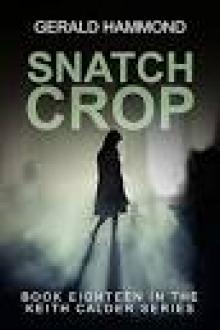 Snatch Crop
Snatch Crop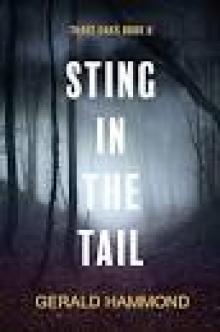 Sting in the Tail (Three Oaks Book 6)
Sting in the Tail (Three Oaks Book 6)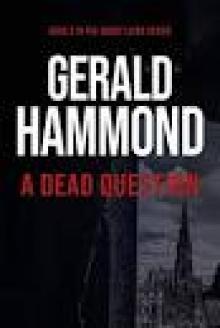 A Dead Question (Honey Laird Book 2)
A Dead Question (Honey Laird Book 2) In Loving Memory (Honey Laird Book 3)
In Loving Memory (Honey Laird Book 3) Thin Air
Thin Air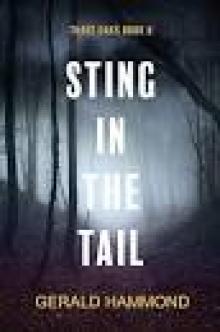 Sting in the Tail
Sting in the Tail Pursuit of Arms
Pursuit of Arms The Game
The Game Give a Dog a Name (Three Oaks Book 4)
Give a Dog a Name (Three Oaks Book 4) Fair Game
Fair Game The Executor (Keith Calder Book 10)
The Executor (Keith Calder Book 10) Whose Dog Are You? (Three Oaks Book 2)
Whose Dog Are You? (Three Oaks Book 2) Mad Dogs and Scotsmen (Three Oaks Book 7)
Mad Dogs and Scotsmen (Three Oaks Book 7) Cousin Once Removed
Cousin Once Removed The Worried Widow
The Worried Widow A Shocking Affair
A Shocking Affair Dead Weight (Three Oaks Book 11)
Dead Weight (Three Oaks Book 11) Whose Dog Are You
Whose Dog Are You The Revenge Game
The Revenge Game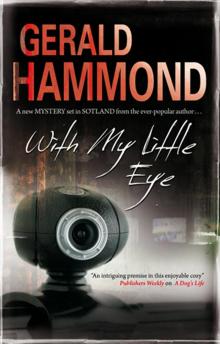 With My Little Eye
With My Little Eye Doghouse (Three Oaks Book 3)
Doghouse (Three Oaks Book 3) In Camera
In Camera Bloodlines (Three Oaks Book 8)
Bloodlines (Three Oaks Book 8) The Unkindest Cut
The Unkindest Cut